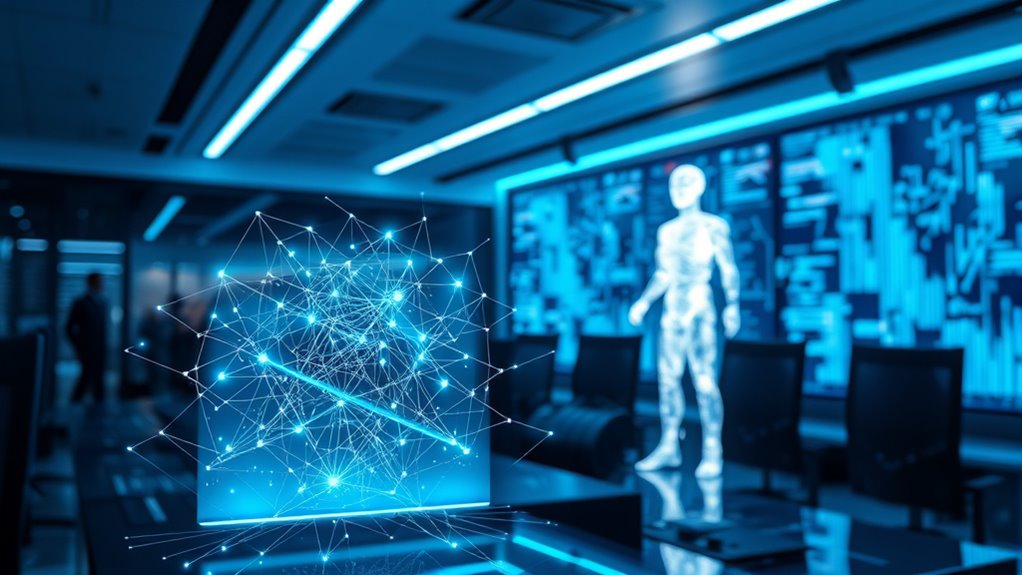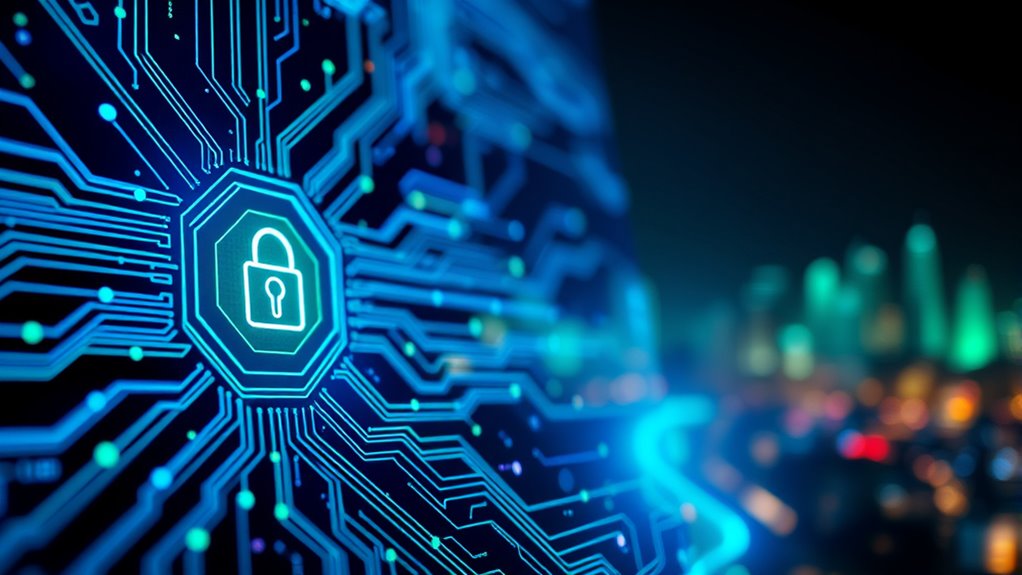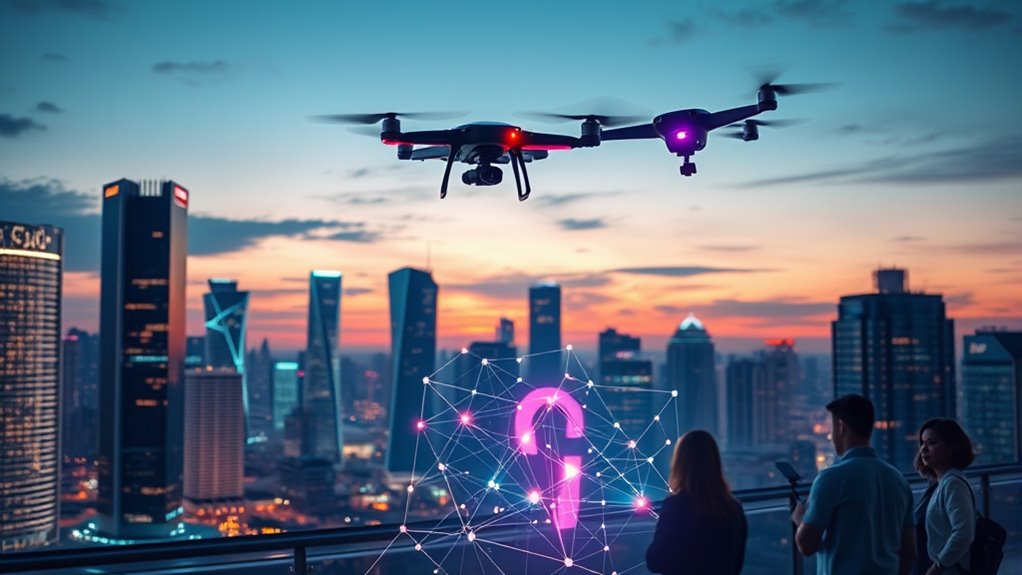AI and blockchain are revolutionizing secure transactions by boosting security, enhancing efficiency, and promoting transparency. AI helps detect anomalies and fraud in real-time, while blockchain provides an immutable ledger for accountability. You can complete transactions quickly without intermediaries, and smart contracts ensure accuracy. These technologies also tackle challenges like scalability and regulatory uncertainty. If you’re curious about how these innovations continue to evolve and shape the future, there’s much more to explore.
Key Takeaways
- AI enhances security in blockchain by detecting anomalies and providing real-time alerts for suspicious transactions, thus ensuring safer transactions.
- The integration of AI automates financial processes in blockchain, reducing errors and expediting transaction times significantly.
- Blockchain’s immutable ledger, combined with AI, fosters transparency and trust, enabling participants to verify transactions easily.
- AI optimizes transaction routing and liquidity management within blockchain ecosystems, lowering costs and increasing efficiency in secure transactions.
- Addressing scalability and interoperability challenges through AI and blockchain collaboration can further enhance the future of secure transactions.
Enhanced Security Through AI Integration

As blockchain technology evolves, integrating AI enhances security by enabling proactive measures against potential threats.
You’ll find that AI systems excel at anomaly detection, closely monitoring transactions and smart contracts to pinpoint unusual behaviors that could signal security breaches. By recognizing patterns in vast data, AI establishes baselines for normal activities, making it easier to detect fraudulent actions.
Predictive analysis allows AI to foresee potential risks, ensuring you’re always one step ahead. Moreover, AI’s real-time fraud detection capabilities provide immediate alerts for suspicious transactions, allowing quick responses.
Predictive analysis empowers AI to anticipate risks, while real-time fraud detection ensures swift alerts for suspicious activities.
Enhanced identity verification through AI reduces impersonation risks, making your blockchain ecosystem more secure. With these advancements, you can feel confident in the protection AI provides in your blockchain operations.
Improving Efficiency in Financial Transactions

Improving efficiency in financial transactions is crucial for businesses and consumers alike, especially in a rapidly evolving digital landscape. By leveraging blockchain technology, you can eliminate intermediaries, speeding up transactions from days to mere minutes.
Direct peer-to-peer transactions and real-time settlements enhance cross-border payments, making them faster and more reliable. AI further automates processes, reducing manual intervention and minimizing errors.
With smart contracts, transactions execute automatically when conditions are met, ensuring accuracy. Additionally, AI optimizes routing, lowering costs and improving liquidity management. Furthermore, incorporating diversification strategies can help mitigate risks associated with fluctuating market conditions.
Ensuring Transparency and Trust in Blockchain

Enhancing efficiency in financial transactions opens the door to deeper discussions about the trust and transparency that blockchain technology offers.
With its decentralized network, no single entity controls the data, which minimizes the risk of breaches and enhances security. Transparency allows you and other participants to view and validate transactions, fostering trust through data integrity.
Blockchain’s immutable ledger ensures that once a transaction is recorded, it can’t be altered or deleted, making it crucial for both finance and healthcare. This tamper-proof nature promotes accountability, as all transactions are verifiable.
Innovative Applications of AI and Blockchain

While traditional systems often struggle with issues like inefficiency and lack of transparency, the combination of AI and blockchain is revolutionizing various sectors.
The fusion of AI and blockchain is transforming industries by addressing inefficiencies and enhancing transparency.
In content analysis, AI can filter misinformation and detect bias, while blockchain ensures content authenticity.
For virtual events, AI creates immersive environments, and blockchain secures access and ticketing.
In music creation, AI generates unique compositions, and blockchain manages rights and royalties transparently.
When it comes to electronic health records, AI predicts health issues, and blockchain provides secure, patient-controlled storage.
Lastly, in supply chain management, blockchain enhances transparency, while AI supports demand forecasting.
These innovative applications highlight how AI and blockchain work together to enhance efficiency, security, and trust across industries.
Overcoming Challenges in AI and Blockchain Integration

As organizations explore the integration of AI and blockchain, they encounter several significant challenges that must be addressed.
Scalability issues arise due to the heavy computational resources both technologies require, leading to performance bottlenecks. You might consider off-chain data storage and layer-2 scaling techniques to alleviate these concerns.
Interoperability also presents a hurdle, as ensuring seamless communication between diverse platforms requires standardization protocols.
Privacy and security risks, like data exposure on transparent ledgers, need careful attention, possibly through encryption techniques like zero-knowledge proofs.
Finally, navigating regulatory uncertainty calls for collaboration among stakeholders to establish clear frameworks.
Future Trends in Secure Transactions

With the rapid evolution of technology, secure transactions are becoming increasingly sophisticated, driven by advancements in AI, blockchain, and biometric authentication.
AI’s role in fraud detection is expanding, allowing real-time analysis of transaction data to spot suspicious activities. By 2025, AI-driven systems will likely become the industry standard, significantly reducing false declines. Natural Language Processing has also enhanced customer interactions, streamlining communication during transactions and improving overall service efficiency.
Blockchain technology enhances security through its tamper-proof ledger, while smart contracts automate complex transactions, cutting costs and processing times.
As biometric methods like fingerprint and facial recognition gain traction, expect around 80% of transactions to rely on these for authentication by 2025.
Together, these trends promise a more secure, efficient, and trusted landscape for digital transactions moving forward.
Frequently Asked Questions
How Does AI Learn From Blockchain Transaction Data?
AI learns from blockchain transaction data by analyzing patterns and identifying anomalies.
You can think of it like a detective, noticing unusual activity that might signal fraud. As it processes more data, it adapts and improves its detection capabilities.
You’ll find that this continuous learning helps AI stay ahead of new tactics used by fraudsters.
With real-time analysis, you gain timely insights into potential threats, enhancing overall transaction security.
Can Blockchain Technology Be Integrated With Existing Financial Systems?
Yes, blockchain technology can be integrated with existing financial systems.
You’ll find that using hybrid solutions combines the security of blockchain with the familiarity of traditional finance. Interoperability protocols help connect different blockchain networks, easing integration challenges.
Additionally, clear regulatory frameworks provide the confidence needed for banks to adopt these technologies.
With user-friendly interfaces and private blockchains, the transition becomes smoother, enhancing efficiency while maintaining compatibility with legacy systems.
What Are the Costs Associated With Implementing AI and Blockchain Technologies?
Implementing AI and blockchain technologies can feel like a double-edged sword—promising innovation but also demanding significant investment.
You’ll face development costs ranging from $40,000 to $300,000, plus maintenance expenses of 15% to 25% of the project’s total.
If you opt for a private blockchain, expect monthly fees around $1,500.
Factor in hiring skilled developers, and you’ll see how costs can quickly add up.
Balancing potential gains with these expenses is crucial.
How Do AI and Blockchain Enhance User Privacy?
AI and blockchain enhance your privacy by giving you control over your personal data.
With blockchain, you can selectively share information while keeping the rest private. Encryption ensures that only authorized parties can access your data.
AI further protects you by masking sensitive information and verifying identities through biometric methods.
Together, these technologies create a secure environment where you maintain ownership of your data, minimizing the risk of unauthorized access and breaches.
What Industries Benefit Most From AI and Blockchain Integration?
Imagine a symphony where AI and blockchain play in perfect harmony. You’ll find industries like healthcare, finance, and supply chain thriving from their integration.
In healthcare, AI predicts diseases while blockchain secures patient data.
In finance, AI detects fraud as blockchain ensures transaction security.
The supply chain benefits from AI’s predictive analytics and blockchain’s transparent tracking.
Embracing this duet empowers businesses to innovate and streamline operations, enhancing overall efficiency and trust.
Conclusion
Incorporating AI into blockchain technology isn’t just a trend; it’s revolutionizing secure transactions. Did you know that by 2025, the global blockchain market is projected to reach $67.4 billion? This staggering growth highlights the importance of embracing these innovations. As you navigate this evolving landscape, remember that AI and blockchain are not just enhancing security and efficiency—they’re also paving the way for a more transparent and trustworthy financial future. Get ready to be part of this transformation!










